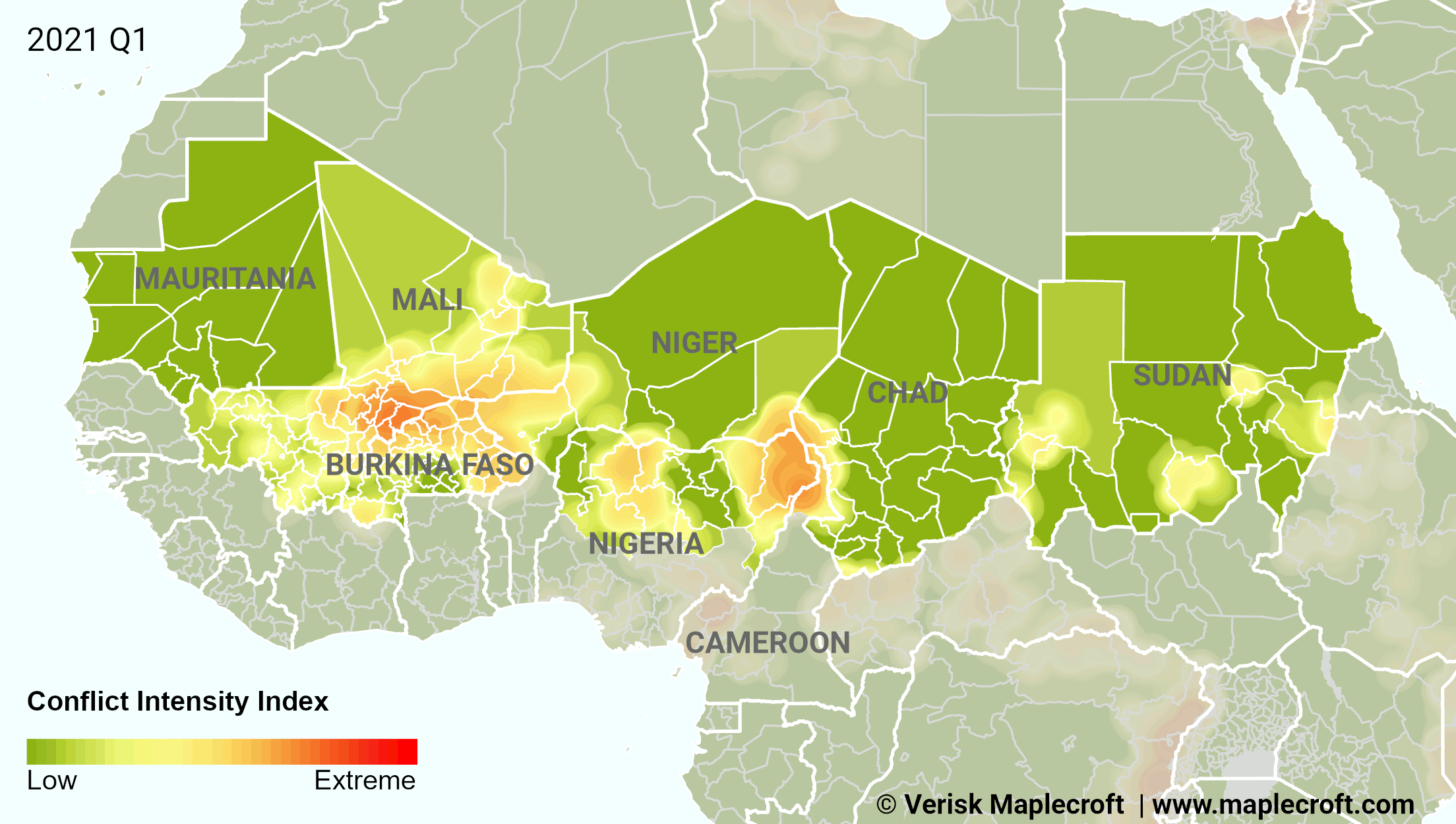Sahel's downward spiral fuelled by weak governance, climate change
by Ben Hunter and Eric Humphery-Smith,
The Sahel’s downward spiral into instability and conflict looks set to continue, as the structural fragility of its countries feeds a vicious cycle of violence that will see 2022 become the region’s deadliest year since 2017.
Our data shows that the risks posed to businesses operating in the Sahel are becoming more pronounced, as factors such as weak governance, political volatility and the escalation of the climate crisis combine to stoke regional tensions and provide fertile ground for the region’s armed non-state actors to recruit.
Indeed, our analysis reveals that the Sahel’s performance across a subset of environmental, governance, social and political (ESG+P) issues – ranging from corruption and democratic governance to forced labour and climate change vulnerability – has worsened since 2017.
Figure 1: Violence underpinned by weak structural safeguards
The deterioration of these key structural issues is fueling violence across four key conflict zones: the Central Sahel (Mali, Burkina Faso and western Niger), north-western Nigeria, Lake Chad (north-eastern Nigeria, northern Cameroon, western Chad and eastern Niger), and Sudan’s Darfur region.
“Escalating violence will threaten industry across the region, such as Burkina Faso’s gold sector, as well as large mines in western Mali which had until recently appeared out of reach of militants,” says Benjamin Hunter, Africa Analyst.
“While neighbouring countries possess stronger structural safeguards, they are far from immune to widening conflict – particularly in the northern regions of coastal West African states, where Islamist militants are increasingly looking to expand their influence.”
Ineffective governance breeds violence across the Sahel
The individual drivers behind the Sahelian conflicts are diverse, ranging from the communal, localised strife seen in north-western Nigeria and Darfur through to the fight against Islamist insurgents across the Central Sahel (the region’s deadliest conflict – see Figure 3) and Lake Chad, but the proliferation of violence is collectively underpinned by the region’s structural weaknesses.
For example, factors such as the marginalisation of minority communities stoke conflict by depriving Sahelian populations of social and political agency, incentivising violence and enabling the spread of radicalising ideologies. Indeed, all eight of the Sahelian countries fall within the highest risk categories of our Minority Rights Index. The real-world impacts of this have been evidenced in the Central Sahel, where Islamist insurgents have exploited tensions between Fulani pastoralist groups and farming communities to expand from Mali into Burkina Faso and Niger.
Figure 3: The Central Sahel is the epicentre of conflict in the region
At the same time, the region’s weak governments are both a cause and a symptom of conflict. Eight of the 13 coups globally in the last five years were in the Sahel, compared to just two across the rest of Africa. Sudan’s military coup in October 2021 caused fatalities in Darfur to rise by 67% in the following six months compared with the six months prior as Khartoum’s new allies attacked communal rivals, in turn sparking retaliations and an escalating cycle of violence.
On the other hand, the democratic regime in Burkina Faso fell to a military coup in January 2022 because it lost the army's confidence. The conflict, therefore, appears to have driven government instability, and a second coup in less than a year in September 2022 indicates the problem is far from resolved. This self-fulfilling cycle allowed insurgents to exploit new divides within the military to expand its operations, seeing a 35% increase in deaths in the six months following the first coup, and we expect this trend to continue through to the end of 2022 following the second putsch.
Conflict exacerbated by climate-driven upheaval
Climate change is also fueling conflict in the Sahel by prompting shifts in agricultural production and nomadic lifestyles. For example, the Fulani-Hausa conflict in north-western Nigeria is being heightened by the scarcity of grazing pastures amid rising temperatures. The reverse can also occur, as in Darfur, where new grazing lands opened up by climate change in the 1980s drove the inward migration of Arab-identifying nomads - sowing the seeds of the current conflict.
Our Heat Stress and Poverty indices reflect the strong interconnection between climate change and socio-economic deprivation in the Sahel, but there are few signs of this situation improving. The World Bank projects an increase in poverty and inequality under every growth and carbon emissions scenario, particularly in rural areas, while a worst-case emissions scenario sees the GDP of Sahelian states shrink by up to 11.9% by 2050.
Figure 4: The Sahel faces an acute combined risk of heat stress and poverty
Proliferation more likely than peace
Geopolitical tensions between Brussels and Moscow ignited by the invasion of Ukraine will exacerbate the Central Sahel conflict over the next two years. The EU is expanding security aid for regional governments that might otherwise be tempted to hire Russian mercenaries, despite the bloc’s previous commitment to prioritise solving the underlying drivers of violence instead.
At the same time, there has already been a proliferation of Islamist insurgencies towards West African coastal states, including Benin, Togo and Côte d’Ivoire. The Beninese government has already requested Rwandan support in combatting JNIM militants in the country’s north, and there are increasingly audible, albeit unconfirmed, rumours of ISWAP’s presence throughout southern Nigeria.
“Alarm bells have been sounding for years, pointing to the risk of the Sahel conflict expanding, but never has this threat been greater than now,” adds Hunter. “While major commodity supply disruption remains unlikely in the near term, smallholder farmers will be increasingly preyed on, infrastructure arteries and commodity export routes obstructed, as well as expatriate personnel being targeted. Not only will there be growing physical impacts, but the reactiveness of markets to these dynamics will equally begin to trigger inflationary and fiscal pressures.”
Find out more about our Government Stability Index
